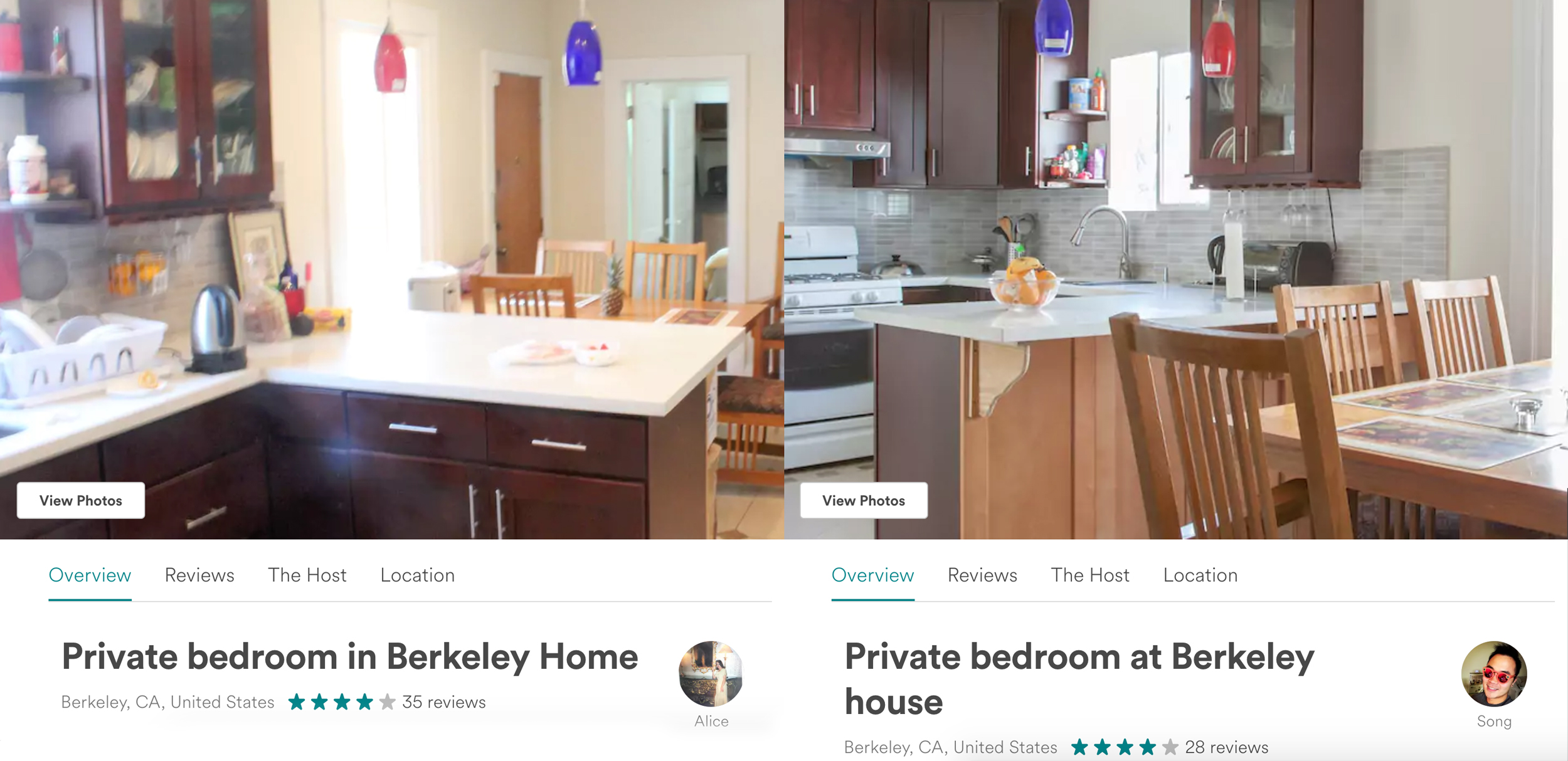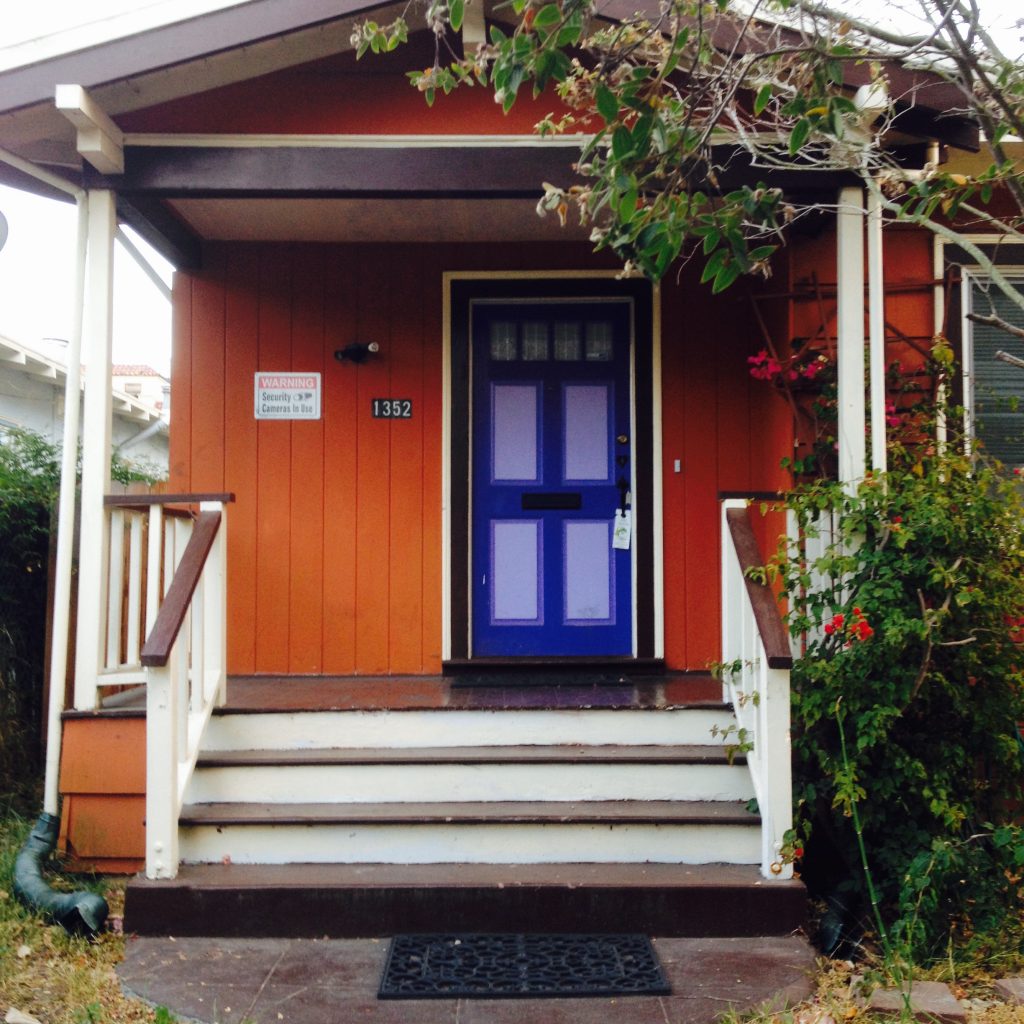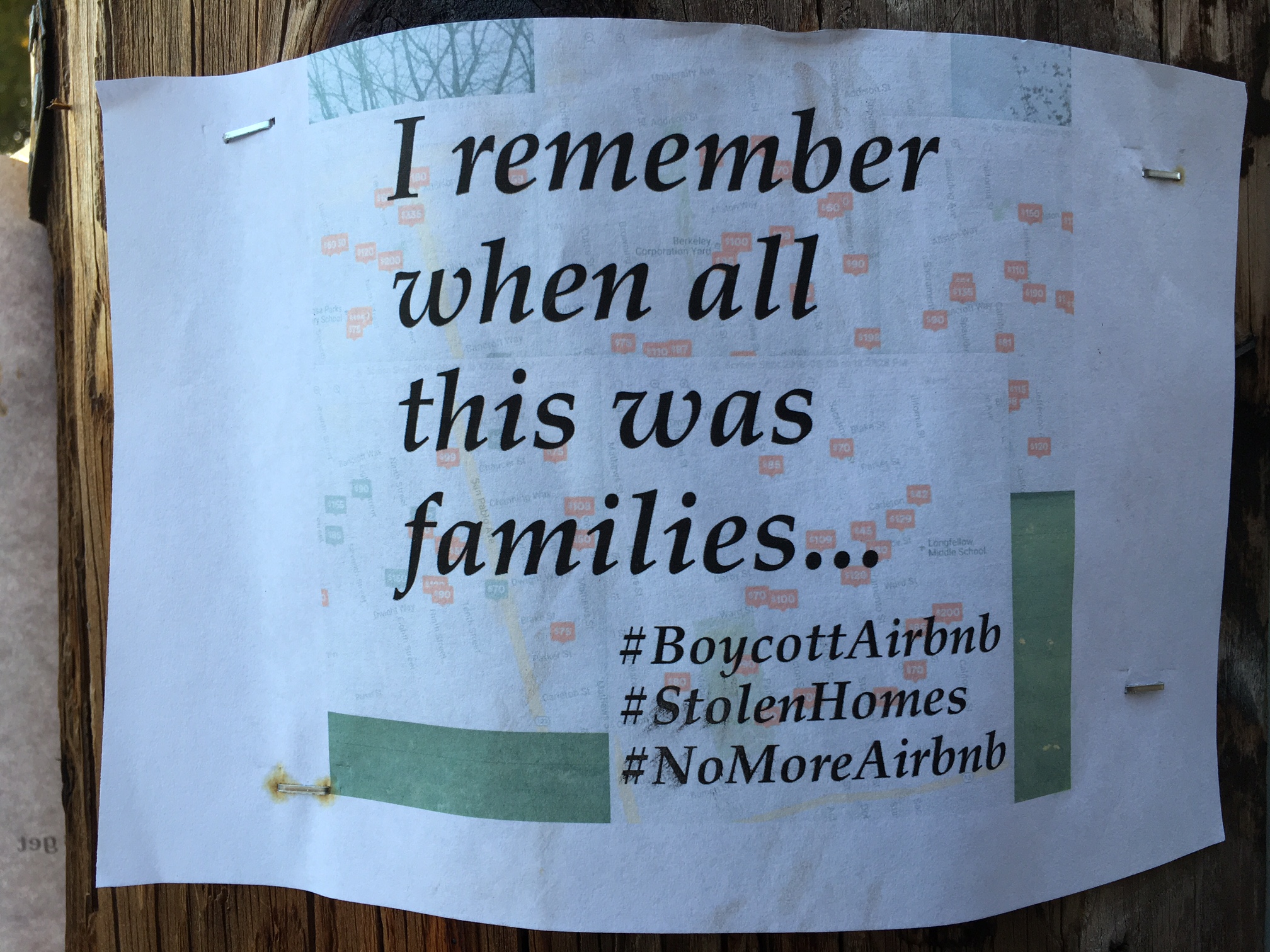Airbnb Threatens Lawsuit, City Council Backs Down Fast
Businesses do not like to be regulated. In fact, Airbnb sued San Francisco, Santa Monica, and New York City quite some time ago about the same issue they have now threatened to sue Berkeley about – yet in all the discussions City Council had about short term rentals (STRs), they have never discussed those lawsuits?
Airbnb and HomeAway say they are protected when they advertise illegal rentals just like YouTube and Yelp are protected when they host user content. Not exactly the same thing? Craigslist was recently found not to be responsible for housing ads that ban minorities, with the court saying it would be like FedEx looking in every package. However, Airbnb makes money directly off the services it markets and also already claims to vet the listings in other ways. Are short term rental hosting platforms like social media, or are they like e-commerce sites?
Airbnb has invoked Section 230 of the Communications Decency Act. As San Francisco Deputy City Attorney Robb Kapla said, Section 230 doesn’t apply. “San Francisco is regulating commercial transactions, not speech,” he said.
Also, some Council members have said to me that if Berkeley doesn’t give in to the mega corporation’s threats, then Berkeley’s new STR Law could be put on hold – that would be great! Right now, short term rentals are just illegal! Why not just enforce that so we can have those 200-400 homes for rent again?
That is the real problem with Short Term Rentals in Berkeley – that the city staff and city leaders have refused to enforce ANY short term rental provisions while trying to get a law legalizing some of the rentals in place. Berkeley is sending the wrong message – essentially telling owners it’s OK to break the law. By changing our new law in response to a threat instead of joining Santa Monica and San Francisco in fighting for our housing, Berkeley is sending another wrong message.
San Francisco’s law was not put on hold, just enforcement of the provision fining platforms who list illegal hosts. So why doesn’t Berkeley join on the side of SF and Santa Monica the way that HomeAway and some big property managers have joined on the side of Airbnb? If Berkeley won’t fight the lawsuit, why not file an amicus brief?
Instead the City Council voted unanimously to edit the new law – a law that has had countless public hearings and been debated for almost three years – just the way Airbnb asked them to!
Additionally, the Council report our new renter-Mayor Jesse Arreguin submitted said that changing this key enforcement provision will cost Berkeley nothing. But Berkeley contracts with an outside vendor to (not do) its enforcement. If every ad has to show the host has registered, how much easier will it be to see who is legal and who is not? How much money will that save Berkeley?
Again, it would also be really easy to see who is breaking the law if we just went back to not allowing any short term rentals, and enforced that! Isn’t that what our leaders should be saying to Airbnb? Isn’t this just a big game of chicken?
Then the item from Jesse Arreguin goes even further: it says Berkeley will lose money if Council doesn’t do what Airbnb wants, not because we will be sued, but because we won’t get revenue from short term rental listings. Like we just sold Berkeley’s housing rights? Actually we could generate a lot of money by fining all the people who are already breaking the law.
Shouldn’t the City Council have at least held a closed session to discuss pending litigation before they let Airbnb off the hook?
Santa Monica responded to their lawsuit – which actually claims the law violates the US Constitution – by making their rules even stricter and demanding any business renting for the short term appear on a public city registry just like other small businesses do. This is something BTU asked for in Berkeley, so we could make complaints and track enforcement by being able to see who is legally registered. But even Berkeley’s new City Council would not do this for tenants. The registry is not public.
In San Francisco, New York, and many other places they have moved toward more and more restrictive laws because owners just continue to ignore them. In San Francisco, Airbnb made a big show of taking 900 of the thousands of illegal listings off of their site. In New York, you can now call 311 if you think your neighbor is running an illegal hotel.
Santa Monica recently won a case where a large landlord created fake profiles to get around the local laws. BTU has found several owners with fake profiles, including some who rent all the rooms in one house under two different “host profiles” to disguise that they are renting a whole unit, since renting rooms is allowed under Berkeley’s new law.
Another trend we see in Berkeley is that large landlords who had complaints filed against them just move their listings away from Airbnb and HomeAway and try to hide them on Sabbatical Homes, Flipkey, or even Craigslist.
Berkeley Council Has Second Reading April 25th – it’s not too late!
Meet the New Boss, Same As the Old Boss?
“After over two years of discussion and a lengthy community process, the City Council voted on an ordinance that would regulate Short Term Rentals (STRs) in a balanced way that ensures people can rent out a spare unit, while preventing the exploitation of converting units into mini-hotels. The ordinance provides a method of enforcement that would make it easy to identify violators, and prevent Accessory Dwelling Units from being used as STRs (a position 8 out of 9 members of the Council agreed on). However, during the second reading of the ordinance, last minute changes were proposed that jeopardized the entire process. Despite a previous consensus, several Councilmembers are backtracking as a result of intensive lobbying from Airbnb, which among other things would make it very difficult to enforce.”
Jesse Arreguin, July 2016 Newsletter
Airbnb Letter to Berkeley and City Council Response
“After consultation with AirBnB representatives and City Attorney, it is prudent to strike this section to avoid unnecessary litigation so the ordinance can move forward and so AirBnB can work cooperatively with the city in implementation.”
2017-04-04 Item 11 Amending BMC Section 23C 22 050, Short-Term Rental-1
San Francisco Lawsuit: Initial Ruling Against AirBnB
“City Attorney Dennis Herrera applauded the ruling. “I am grateful for Judge Donato’s thoughtful ruling recognizing that just because Airbnb and Homeaway conduct their business online, they are not exempt from any regulation of their commercial transactions,” he said in a statement. “Online businesses don’t get a free pass from the types of regulations that apply to other businesses in San Francisco.”
http://www.sfgate.com/business/article/Airbnb-rebuked-in-SF-lawsuit-10602042.php
Why San Francisco is Winning
“James Donato, a US District Court Judge for California’s Northern District, didn’t see it that way. In November 2016, he dealt a major setback to Airbnb when he rejected the company’s request to block the ordinance. Donato didn’t buy Airbnb’s Section 230 argument. As he put it, San Francisco’s ordinance doesn’t treat Airbnb as the publisher of illegal rental listings, nor does it force Airbnb to police its website and remove such listings. It simply holds Airbnb accountable for its own conduct: providing “booking services” in connection with unregistered units.”
https://backchannel.com/the-most-important-law-in-tech-has-a-problem-64f5464128b6

Details About Each Step of the SF Case:
http://ia601908.us.archive.org/8/items/gov.uscourts.cand.300367/gov.uscourts.cand.300367.docket.html
Airbnb Pulls 900 Illegal SF Listings
http://www.sfweekly.com/news/airbnb-ousts-nearly-1000-sf-home-listings/
Santa Monica Sued In September
“The goal of Santa Monica’s legislation is to eliminate so-called “rentalpreneurs”, people who use services like Airbnb to lease out several units that, critics argue, would otherwise be used as housing stock in L.A.’s historically tight rental market. For example, a group of evicted tenants sued their former landlord last December, after their old homes showed up in Airbnb’s listing pages.”
http://laist.com/2016/09/03/airbnb_sues_santa_monica_over_airbn.php
Santa Monica Responds by Making Law Tougher
“The City Council voted 4-0 to require all “home sharing” hosts to not only register with the City but have their information published on a special registry compiled by the City. Officials said it is not unusual for businesses to opt out of such lists, but that eliminating the choice in this case will make it easier for the City to catch hosts who are operating without having registered.”
http://www.surfsantamonica.com/ssm_site/the_lookout/news/News-2017/January-2017/01_12_2017_Santa_Monica_Gets_Even_Tougher_on_Short_Term_Vacation_Rental_Hosts.html
Details on Santa Monica Lawsuit
http://strfacts.com/wp-content/uploads/2016/02/Airbnb-Santa-Monica-Complaint.pdf
More About the Law Airbnb Invoked
“In Airbnb’s case, the short-term rental giant is arguing that although some people might be breaking the law by listing property on Airbnb without first registering with the city, Airbnb isn’t responsible — and can’t be held accountable — for what people decide to list on its platform.”
http://www.latimes.com/business/technology/la-fi-tn-airbnb-free-speech-20160629-snap-story.html
Tech Industry Wants Its Shield
“…Detractors say the law has been applied too broadly, and judges have pushed back in a string of recent cases. Section 230 was intended to protect free speech online by removing liability for a newspaper, say, for libelous comments posted on their websites by readers.
But Deputy City Attorney Robb Kapla said Section 230 doesn’t apply.” San Francisco is regulating commercial transactions, not speech,” he said.”
http://www.reuters.com/article/us-tech-court-idUSKCN10T0ET
Santa Monica Wins Another Case
“The city accused Globe of hiding its activities from investigators through subterfuge, which according to news reports included creating phony Airbnb profiles for owners. Globe is appealing.”
https://www.courthousenews.com/class-home-sharers-can-sue-santa-monica/
AirBnB Drops Lawsuit Against New York
“Airbnb on Friday agreed that it would drop the suit as long as New York City enforces the new law only against hosts and does not fine Airbnb. The settlement takes effect on Monday.”
https://www.nytimes.com/2016/12/03/technology/airbnb-ends-fight-with-new-york-city-over-fines.html?_r=0
Craigslist Not Responsible for Housing Discrimination
“Traditional statutes are now being applied to e-commerce models. For instance, the anti-discrimination clauses of the United States (“US”) Fair Housing Act (“FHA”) have been examined in the case of online classifieds companies like Craigslist. And, a clause under the Communication Decency Act (applicable to explicit content) has been applied to this case.”
http://www.ibls.com/internet_law_news_portal_view.aspx?s=latestnews&id=2014
Related Issue – Renters Subletting
In Berkeley, the new STR law prohibits renters from doing a short term rental without permission from the owner. BTU didn’t oppose this even though it seems unfair on the surface. That is because we hear about renters getting evicted for using platforms like Airbnb. Not only do most written leases prohibit subletting and assignment (like taking money to let someone else use your apartment) – the Rent Ordinance also does not allow a master tenant (person on the lease) to charge more than the rent controlled rent. That means if the rent is $2000 a month, the rent is about $66 a day, and charging more than that is against the law.
Property Manager Sues AirBnB
“It is not acceptable to us that Airbnb actively promotes and profits from deliberate breaches of our leases, and does so in utter disregard of the disrespectful and unsafe situations created for our full-time residents and their families,” Aimco CEO Terry Considine said in a statement.”
https://techcrunch.com/2017/02/18/a-big-apartment-management-company-is-suing-airbnb/



